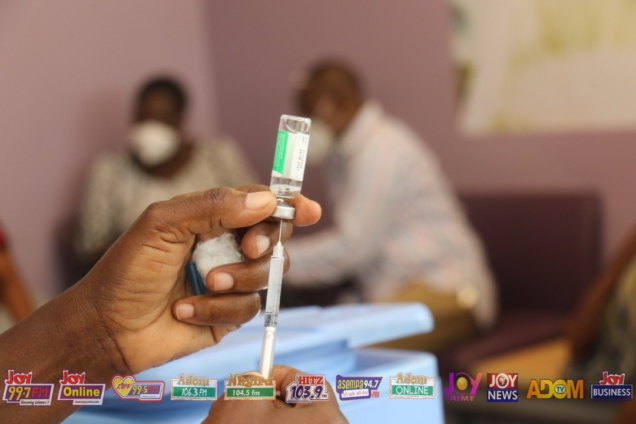Programmes Manager of the Extended Programme on Immunization (EPI) says World Health Organisation (WHO) scientific reports reveal that taking the second Covid-19 dose in a 12-week span is not detrimental to the health of vaccinated persons.
In an interview with JoyFM, Dr Kwame Amponsah-Achiano indicated that it is prudent and more potent for one to receive his or her second jab 12 weeks after receiving the first dose.
“If you look at the WHO guidelines carefully, the guidelines state that the earliest time to give the vaccine that is after receiving the first dose is eight to 12 weeks. That is the optimum time. If you look at the guidance from the manufacturer, you can see that the second dose can be given at any moment from four weeks to 12 weeks.
“The current data even shows that if you give the second dose around 12 weeks or soon after it is even better,” he told Emefa Apawu on Joy FM's Midday News.
According to the EPI’s Manager, the Ghana Health Service (GHS) is adhering to the standard procedures and timelines in the provision of vaccines to Ghanaians, thus the postponement poses no threat to the health of Ghanaians.
“We as a country are guided by some guidelines from WHO and the scientific community. So we are guided by that and that is what I know the country is working towards,” he said.
Dr Amponsah-Achiano also gave the assurance that there is no call for alarm since there is no maximum time period but rather a minimum with regards to vaccines.
His comment falls in line to address worries expressed by Ghanaians over reports that the delay of the second phase of vaccines which was expected to take place this month but has been rescheduled to May could render the first batch of vaccinated persons susceptible to the virus.
Meanwhile, Kumasi Centre for Collaborative Research (KCCR) virologist, Dr Michael Owusu has intimated that the efficacy and potency of the AstraZeneca vaccines may be affected if not administered within the 8 to 12 weeks period.
"Assuming that we have to extend this beyond 12 weeks, the first thing is that we cannot be sure of the efficacy that had been indicated in the AstraZeneca vaccine because the efficacy indicated between 70 to 90 per cent is based on the data available which is 8 to 12 weeks. Beyond the 12 weeks, you can't be sure," he stated.
But Dr Amponsah-Achiano proceeded to entreate persons to dismiss claims that should they not receive the second dose after the first 8 weeks, they would no longer be protected against the virus.
"The Director-General [Kuma Aboagye] was clear that the 8 weeks was the earliest time we chose to give the second dose. It is not as if, if you miss the 8 weeks, then that is it, that your protection is gone, no. That is not true at all," he stated.
Latest Stories
-
I’m confident posterity will judge my performance well – Akufo-Addo
10 minutes -
Syria’s minorities seek security as country charts new future
51 minutes -
Prof. Nana Aba Appiah Amfo re-appointed as Vice-Chancellor of the University of Ghana
58 minutes -
German police probe market attack security and warnings
58 minutes -
Grief and anger in Magdeburg after Christmas market attack
59 minutes -
Baltasar Coin becomes first Ghanaian meme coin to hit DEX Screener at $100K market cap
2 hours -
EC blames re-collation of disputed results on widespread lawlessness by party supporters
2 hours -
Top 20 Ghanaian songs released in 2024
2 hours -
Beating Messi’s Inter Miami to MLS Cup feels amazing – Joseph Paintsil
3 hours -
NDC administration will reverse all ‘last-minute’ gov’t employee promotions – Asiedu Nketiah
3 hours -
Kudus sights ‘authority and kingship’ for elephant stool celebration
3 hours -
We’ll embrace cutting-edge technologies to address emerging healthcare needs – Prof. Antwi-Kusi
3 hours -
Nana Aba Anamoah, Cwesi Oteng special guests for Philip Nai and Friends’ charity event
3 hours -
Environmental protection officers receive training on how to tackle climate change
4 hours -
CLOGSAG vows to resist partisan appointments in Civil, Local Government Service
5 hours

